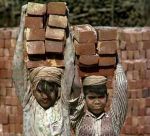Manufactured Goods
“The severe exploitation of China’s factory workers and the contraction of the American middle class, are two sides of the same coin.”
~ Mark Barenberg, Professor of International Labor Law, Columbia University
Turning raw materials into finished goods requires labor. Even in instances where mechanization has drastically reduced the need, human labor remains a costly part of the process. In today’s highly competitive global market, reducing costs has become key for many businesses. In the case of products that are necessarily labor intensive, this has led to abusive practices including the use of forced labor and child labor. Some of the industries where these abuses are common include apparel manufacturing, the footwear industry, the production of sporting goods, carpet weaving, kiln work including pottery and bricks, and many handcrafts such as basket making and bead work. Additionally, a great many manufactured items contain elements in their supply chain that may stem from slave labor. Examples include the rubber in tires, the mica in cosmetics, or the tantalum used in computers and cell phones.
We all love a bargain. It is human nature to seek good value and maximize our resources. But it is also human nature to value fairness, to seek justice, and to have empathy for others. If you were in a position to look inside a sweatshop where you saw that women and children were being grossly abused, mistreated, overworked and beaten… would you still be happy with that six dollar shirt? Would you pride yourself on the bargain you had acquired? Certainly most of us would not. Yet these are conditions we may unwittingly support in our quest for ever cheaper goods. The world of marketing has successfully divorced us from the source of almost everything we consume. This cultural shift has accelerated in recent decades. Retailers have manipulated us to value low cost disposable goods over quality, craftsmanship and durability. This new paradigm is not without consequences. Noted labor expert Robert Bruno (Co-Director, Labor Education Program, University of Illinois) observes:
“Because of the low-cost imperative, you have a vicious cycle, squeezing workers up and down the value chain. This impoverishes them and makes it impossible for them to achieve social mobility. What’s happening is that we are creating low-income workers who become low-wage consumers who seek low-priced goods. Stores are built strategically to cater to these low-wage earners, filled with products that are there for the single reason that they are affordable. This is a diabolical strategy, an evil strategy. What it comes down to is one group of workers eating another while the big boys in corporate sit back and watch the carnage. This thing could take us down.”
This description is the antithesis of Henry Ford’s great precept that his worker’s prosperity was linked to his company’s profitability. While he pioneered the assembly line to reduce manufacturing costs, he did not consider his employees disposable. Rather he paid higher than average wages and instituted profit sharing that enabled some workers to afford the fruits of their labor. The company, the workers, and the community all thrived.
Today this race to the bottom is driven in large measure by the huge chain stores and discounters who command such a major market share that they are able to virtually dictate terms to producers. In the global market place, enforceable regulation is scant and protections for workers are rare. But it is we, the consumers, who ultimately empower these retailing Goliaths. It is unlikely that we will ever roll back the clock, but there is much value in the adage “Think global, Buy local”. More than ever we are seeing how prophetic Dr. Martin Luther King was when, in 1963, he wrote in his letter from a Birmingham jail:
“Injustice anywhere is a threat to justice everywhere. We are caught in an inescapable network of mutuality, tied in a single garment of destiny. Whatever affects one directly, affects all indirectly.“
So when you are shopping, remember to ask where things come from and how they were produced. An educated consumer is our best hope for ending this pervasive exploitation which ultimately harms us all. Do a bit of homework on companies before buying their products. Look at labels. Resist the temptation to consider only price rather than actual value. While “Made in the USA” and union labels are not absolute guarantors of ethical sourcing, they can be strong indicators. As awareness grows about this issue, some agencies and trade associations have organized to specifically certify products as free of labor abuse. We address these choices you can make, in greater detail, on our page ‘The Ethical Consumer‘. Take a look and commit to begin fighting slavery now!
<previous page ………. next page>
To join us in action and discussion, please visit
Meetup.com/Fight-Slavery-Now


